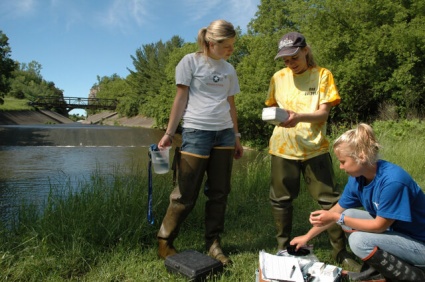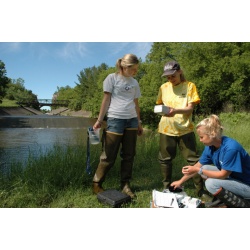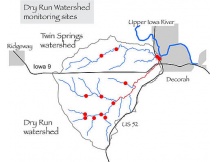
IN DEPTH: Innovative water quality project near Decorah could become a model across the state of Iowa

Farmers, Luther College students and governmental workers are joining forces to improve water quality in a unique project involving the Dry Run Creek Watershed just outside of Decorah.
A nearly $100,000 grant just received from the State of Iowa will allow the Dry Run Creek Watershed Improvement Association to be able to offer cash incentives to landowners as incentives to make changes that will lower bacterial counts in the streams that make up the watershed.
The project started because farmers and other property owners in the watershed wanted to take voluntary steps to improve water quality, according to Association member Paul Hunter. He highlights the fact that the drive for cleaner water is the result of moves made by the property owners, not by governmental requirements.
Landowners in the watershed contacted Luther College and asked whether students would be interested in taking samples of water in the streams. The contact came at a time when Luther College was looking for ways to increase student interest in sustainability issues by integrating such questions into courses.
Luther biology professor Jodi Enos-Berlage tells decorahnews.com that the proposal was intriguing. "There were so many different aspects that were attractive," she says. Students not only had a chance to take water samples, but to research issues like land use and agricultural practices as part of the research into water quality.
Students began taking samples at 13 sites in 2010, then continued sampling at 10 of the sites during 2011. They measured bacteria levels, nitrates, phosphorus levels, ammonia and total nitrogen, looking for differences in readings at the 13 locations, so improvement efforts could be concentrated where they would do the most good.
The landowners also contacted Iowa State University Watershed Project representative Chad Ingels from Fayette County, who had worked with a watershed project in Dubuque County and was eager to have a similar project in Winneshiek County.
With two years' worth of data from the measurements taken by the Luther biology students, Ingels and the landowners were able to apply for the state grant, making a strong case that the cooperation between all the groups would make the project effective.
Last week the project receive $250 less than the possible maximum grant of $100,000.
Ingels says ISU Extension will handle the paperwork and will help prioritize possible projects, concentrating on feedlot runoff and pastured cattle, two sources of the higher bacterial levels in the streams.
Hunter says the landowners in the Association will take care of the job of contacting the other landowners in the area and will be able to offer them financial incentives to help pay for projects such as vegetative filters along the streams, or fencing, or water outlets located 200 or 300 feet away from the streams that will keep cattle from wading in the water.
Enos-Berlage says her biology students will continue to monitor water quality levels in the streams. And she will speak at the Iowa Water Conference in Ames on March 4th and 5th, telling people from around the state how water in the Dry Run Creek Watershed will be improved, thanks to the innovative cooperative agreement among all the groups.
She will also campaign for others to create similar projects. "Success…is going to be achieved at the local level," she tells decorahnews.com, concluding "Water literally connects everybody."
Site designed and maintained by Iroc Web Design Services©.
Your Small Business Web Design Solutions.™


